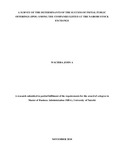| dc.description.abstract | The study under investigation is a survey of the determinants of the success of initial public offerings (IPOS) among the companies listed at the Nairobi Stock Exchange (NSE) whose main objective was to determine the factors that influence a successful IPO.
On the methodology, this research problem was best studied through the use of a descriptive survey because it allows one to collect quantitative data which can be analysed quantitatively using descriptive and inferential statistics whose target population for this study were the companies listed on theNSE. There are 55 listed firms in Kenya. The sample size was the entire population i.e. all the 55 listed firms. Both causal and analytical approaches were used in data analysis. The data was analysed through use of analysis software SPSS.
Results obtained from analysis, are expressed in terms of the signs and statistical significance of the coefficients for the selected five independent variables. The results are categorized on the basis of the independent variables and focuses on their associations with the effects of determinants of a successful IPO on firm value. In this regard the discussion of the variables of the model supported the studies of effects of a successful IPO on firm value as in the case of Kenya firms, the exogenous variables also turn out to be significant, but are negatively related with the firm's performance.
Although firm size as measured by sales revenue should have a positive relationship to the firms value due to the advantages of the economies of scale, organizational inefficiency called x- inefficiency leads to loss of profit, a likely situation in larger firms. A firm's age could work either way. Old firms have a reputation advantage, but they tend to be prone to inertia and bureaucratic rigidities. We found the coefficient of age to be negative, which means that younger firms (typically new age firms) command higher market valuation. | en_US |

